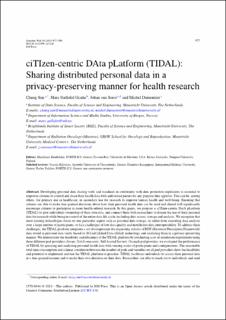ciTIzen-centric DatA pLatform (TIDAL): Sharing Distributed Personal Data in a Privacy-Preserving Manner for Health Research
Journal article, Peer reviewed
Published version

Åpne
Permanent lenke
https://hdl.handle.net/11250/3071112Utgivelsesdato
2023Metadata
Vis full innførselSamlinger
Sammendrag
Developing personal data sharing tools and standards in conformity with data protection regulations is essential to empower citizens to control and share their health data with authorized parties for any purpose they approve. This can be, among others, for primary use in healthcare, or secondary use for research to improve human health and well-being. Ensuring that citizens are able to make fine-grained decisions about how their personal health data can be used and shared will significantly encourage citizens to participate in more health-related research. In this paper, we propose a ciTIzen-centric DatA pLatform (TIDAL) to give individuals ownership of their own data, and connect them with researchers to donate the use of their personal data for research while being in control of the entire data life cycle, including data access, storage and analysis. We recognize that most existing technologies focus on one particular aspect such as personal data storage, or suffer from executing data analysis over a large number of participants, or face challenges of low data quality and insufficient data interoperability. To address these challenges, the TIDAL platform integrates a set of components for requesting subsets of RDF (Resource Description Framework) data stored in personal data vaults based on SOcial LInked Data (Solid) technology and analyzing them in a privacy-preserving manner. We demonstrate the feasibility and efficiency of the TIDAL platform by conducting a set of simulation experiments using three different pod providers (Inrupt, Solidcommunity, Self-hosted Server). On each pod provider, we evaluated the performance of TIDAL by querying and analyzing personal health data with varying scales of participants and configurations. The reasonable total time consumption and a linear correlation between the number of pods and variables on all pod providers show the feasibility and potential to implement and use the TIDAL platform in practice. TIDAL facilitates individuals to access their personal data in a fine-grained manner and to make their own decision on their data. Researchers are able to reach out to individuals and send them digital consent directly for using personal data for health-related research. TIDAL can play an important role to connect citizens, researchers, and data organizations to increase the trust placed by citizens in the processing of personal data.
